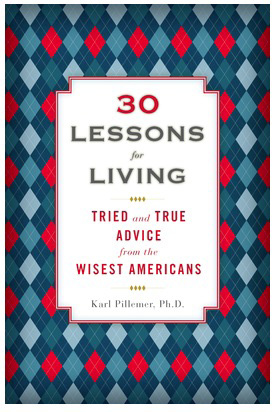In the last edition, I wrote about my mid-life transition that occurred 12 years ago. Reliving the details of that change reminded me of the tremendous risk I felt as I initiated my new plan.
Despite this risk, I knew that my choices were limited. I could remain burned-out and bored with the confines of a full-time clinical practice, or I could undergo some radical changes to my direction and see what happened.
One choice included no risk while the other included some risk (although it was far from financial ruin) but held the hope of freeing me from the trap I felt I was in.
After describing the benefits that followed, I promised to tell you more about a new book that confirms the wisdom of taking calculated risks—especially during the productive years of a person’s career.
 Karl Pillemer, a renowned gerontologist at Cornell University,
wrote a book called "30 lessons for Living: Tried and True Advice from the
Wisest Americans." This book is a
gem. It includes insight that he
distilled from interviewing more than 1000 aged Americans. While no book is
perfect, it does contain themes of wisdom that are truly engaging and appear to
resonate with eternal themes.
Karl Pillemer, a renowned gerontologist at Cornell University,
wrote a book called "30 lessons for Living: Tried and True Advice from the
Wisest Americans." This book is a
gem. It includes insight that he
distilled from interviewing more than 1000 aged Americans. While no book is
perfect, it does contain themes of wisdom that are truly engaging and appear to
resonate with eternal themes.
To give you a quick bit of medicine from this book, read the following "refrigerator list" of principles learned:
1. Choose a career for the intrinsic rewards, not the financial ones.
2. Don’t give up on looking for a job that makes you happy.
3. Make the most of a bad job.
4. Emotional intelligence trumps every other kind.
5. Everyone needs autonomy.
 After reading this list, spend some time soaking in the value
of something this simple and profound. If you think about it, each of these rules
is crucial to the recruiting process—both the interview and the follow-up
process. It is what’s rumbling underneath the surface in the minds of the
candidates.
After reading this list, spend some time soaking in the value
of something this simple and profound. If you think about it, each of these rules
is crucial to the recruiting process—both the interview and the follow-up
process. It is what’s rumbling underneath the surface in the minds of the
candidates.
This is an insightful basis for asking hard-hitting questions: Are you (ie. the candidate) in a career with intrinsic rewards? Are you in search for a job you enjoy? If they doubt their smarts, do you realize how important emotional intelligence is to succeeding? And, lastly, how badly do you want autonomy?
Don't get me wrong. A real estate career is not for everyone. But the people in your pipeline figuratively raised their hands at some point thinking that it just might be for them. Will they regret it later if they don't try?
Dr. Pillemer says, “yes.” At least that’s what most of his research subjects told him:
"I can only channel to you what the consensus of the 1200 elders in the study was. From the end of life, they definitely have a "take a risk" attitude, when it comes to time versus money.
They don't want you to do something that might bankrupt you, but if there's a choice to be able to live comfortably and have more time to actually live life, they recommend trying to make it happen.
It is a balance between being financially secure and having more time, but they really encourage us to not stay longer in a job we hate than absolutely possible."
This is valuable insight because most people whom you interview will be dissatisfied with their current job. This is often their motivation for researching new careers.
If you can help them see the future and overcome their natural aversion to risk, you’ve done them a great service. You’ll also do yourself some good—you’ll hire agents who are motivated to flourish in your organization.
Join the WorkPuzzle Discussion at the Tidemark Online Community (TMOC)
Engage in the WorkPuzzle discussion by joining the TMOC private social network. Commenting on a public blog like WorkPuzzle can be a little intimidating, so why not join the discussion inside the privacy of the TMOC discussion group?
By joining TMOC, you'll get to see who else is in the group and your comments will only be seen by those whom you trust. Joining TMOC is quick, easy, and free (no kidding…this takes less than 2 minutes). To get started, click here.
Already of a member of TMOC? If so, join the WorkPuzzle Dialog Group by clicking on the WorkPuzzle Group icon on the left side of your TMOC homepage. Questions? Email the WorkPuzzle editor (workpuzzle@hiringcenter.net) and we'll walk through the process.
 Editor's Note: This article was written by Dr. David Mashburn. Dave is a Clinical and Consulting Psychologist, a Partner at Tidemark, Inc. and a regular contributor to WorkPuzzle.
Editor's Note: This article was written by Dr. David Mashburn. Dave is a Clinical and Consulting Psychologist, a Partner at Tidemark, Inc. and a regular contributor to WorkPuzzle.




Comments